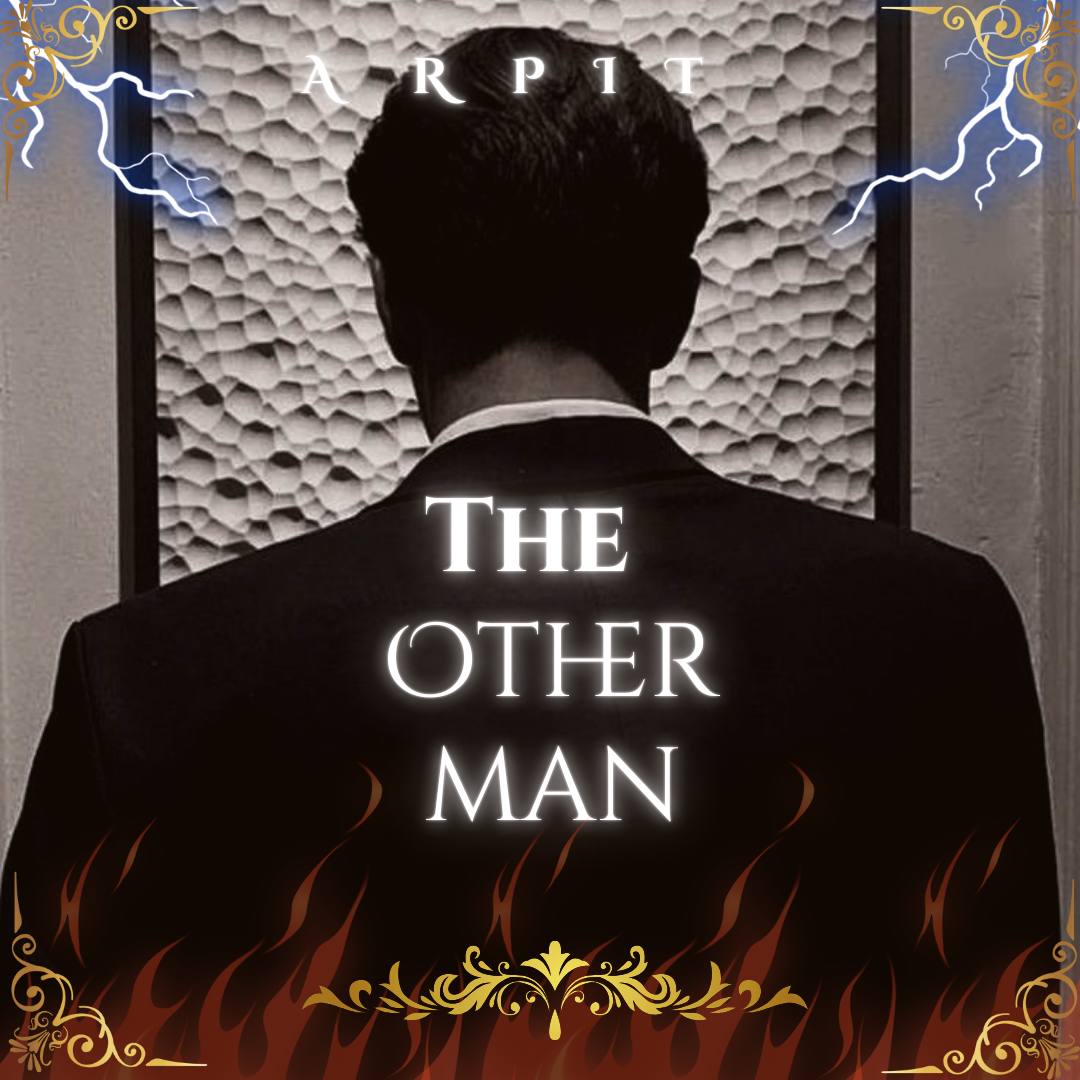
The city was a blur—neon, noise, nameless faces passing by—but inside Tanishk, there was only one face.
Kashish.
Her silence echoed louder than the bass that had pounded through the club all evening. Every drink he downed tasted like her name. Bitter. Sweet. Burning. Forgotten and unforgettable.
The penthouse door slammed shut behind him, ricocheting through the marble-floored emptiness like a final punctuation mark to a night that should’ve never happened.
Three years.
Three years since she was supposed to run away.
Three years since he’d talked to her.
Tanishk stumbled forward, barely shrugging off his jacket. The collar caught on his shoulder, half-hanging as he moved through the penthouse, past the untouched dining table, the cold wine glasses, the vase of dried-out lilies from two weeks ago.
His phone buzzed again.
“Ma” flashed across the screen for the third time.
He let it fall onto the rug.
He didn’t have the strength tonight to talk to Malini Devi about the right time to return to the Aswar estate. Not when every nerve in his body was screaming from the inside out.
He dropped onto the couch like his bones had betrayed him. The leather groaned under his weight. His head lolled back. His breath was uneven. Shirt half untucked. Tie loosened. The sharp scent of whiskey clung to his collar.
The room was dim, lit only by the skyline—towers and streetlights blinking through the glass wall behind him.
He closed his eyes.
And there she was again.
Kashish, in that coral saree she wore on Holi many years ago, laughing with color in her hair.
Tanishk opened his eyes.
The skyline still blinked in quiet rhythm, but something inside him had gone still.
He blinked against the blur of sleep and alcohol, his mouth dry, head pounding. He reached down blindly, dragging his phone off the rug.
The screen lit up—harsh and cold.
6: 50 AM.
12 missed calls.
Nine from Maa sa.
Three from Baba sa.
Tanishk stared.
His fingers hovered over the last missed call. Akhand Chandravanshi.
His father didn’t call. Not without reason. Not ever without reason.
The man’s silences were louder than most people’s wars—and his calls? They meant something had moved in the house of stone.
Tanishk sat upright, adrenaline cutting through the haze like a knife. The weight of exhaustion evaporated beneath the pull of instinct.
Something wasn’t right.
He rubbed his face, trying to shake the fog out of his brain, then stood—unsteady at first, but firming with each step.
He crossed the cold floor of the penthouse and disappeared into the hallway that led to his bedroom. The shadows on the wall shifted as he passed—tall, sharp, unsettled.
Inside, he flicked on the light.
Everything was exactly how he’d left it: the king-sized bed unmade, the cufflinks scattered on the dresser, a bottle of cologne half-empty on the nightstand.
He pulled open the closet door, grabbing a fresh black shirt, dark jeans, and his steel-grey blazer. Fast, precise movements—habit honed over years of urgency.
As he buttoned his shirt, his eyes caught his reflection in the mirror.
Hair tousled. Face pale. Eyes red-rimmed from whiskey and memory.
“You look like hell,” he muttered to himself.
But he didn’t stop dressing.
Because no matter what state he was in, when Akhand Chandravanshi called—you showed up.
Especially after three years of silence.
Especially when he had more to answer for than he cared to admit.
He grabbed his keys, wallet, and slipped on his watch with a practiced click.
As Tanishk descended the stairs, still buttoning the cuffs of his shirt, he noticed a faint light spilling out from the living room.
His steps slowed.
There, standing near the corner console, was Shree.
The shawl around her shoulders clung loosely, her bare feet tucked beneath her on the rug. She was staring at a framed photograph—an old one—perhaps of the family. The way her head tilted, eyes quietly scanning the faces, made her look both out of place and deeply present.
Tanishk didn’t speak immediately.
She hadn’t heard him yet.
But then, sensing movement, she turned.
Her eyes widened slightly as she saw him—and then she stood quickly, straightening her shawl, her posture respectful, alert. There was a flicker of uncertainty in her gaze, not fear, but… hesitation. She hadn’t expected him to be up. Not at this hour.
“Sahib...” she said softly, her voice laced with both reverence and nervousness.
He walked toward her, slowly, eyes scanning her face. She still looked tired—too tired. And pale, like she hadn’t eaten.
“You didn’t sleep?” he asked.
Shree lowered her eyes. “A little… .”
Tanishk’s brows drew slightly. “Did you eat anything?”
She hesitated.
Then shook her head. “No, Sahib.”
“Why?”
Her answer came gently, almost in a whisper. “I… I didn’t know if I was allowed to cook in your kitchen. I didn’t want to use anything without asking. I thought… maybe you’d be angry.”
A beat of silence stretched between them.
Tanishk exhaled, rubbing a hand over the back of his neck. “You were hungry all night and said nothing?”
“I’m used to it,” she said simply. Not with pride—just with quiet truth.
His jaw clenched, guilt flickering behind his eyes.
He hadn’t meant for her to feel unwelcome. Not after what she’d already been through.
He hadn’t asked for her story.
She hadn’t offered one.
But something in her eyes had made him stop. And bring her here. He wanted to protect her.
And now she was here—standing in his home, calling him Sahib, and skipping dinner out of fear .
Tanishk walked past her into the open-plan kitchen. He flicked on the lights, opened the fridge, and pulled out a few things.
“Sit,” he said, not looking back.
Shree didn’t move.
“I said sit,” he repeated, this time more gently. “You’re not a servant here. You don’t need permission to eat.”
Carefully, Shree lowered herself into the dining chair, watching him with wide eyes. Not out of awe—more disbelief.
The man who could silence a boardroom with one glance was now reheating daal.
He poured it into a bowl, added a handful of rice, and set it in front of her with a spoon.
No garnish. No frills. Just food.
Her eyes welled before she could stop them.
“Thank you,” she whispered. “Sahib… I didn’t mean to—”
“You don’t need to explain,” Tanishk cut in, voice low. “Just eat.”
And she did.
Slowly at first. Then faster.
Tanishk leaned against the kitchen counter, arms folded, watching her quietly.
Something about the way she held the spoon, like it was something precious, something earned, unsettled him in a way he couldn’t name.
He didn’t ask her what she’d face.
She didn’t ask him why he saved her.
But between the silence of a marble kitchen and the sound of a spoon clinking against a bowl—something unspoken settled into the room.
Not quite trust.
But maybe the beginning of it.
The wheels of the black SUV crunched softly over the gravel driveway as dawn began to crack across the sky—orange bleeding into grey, the city lights slowly surrendering to daylight.
The Chandravanshi Estate stood at the edge of the old city like a silent monument—its towering iron gates already open, as if expecting him.
Tanishk drove through, jaw tight, eyes sharp.
He hadn’t been here in over a year.
Not since the last time his father had summoned him for that business merger lunch that felt more like a cross-examination. He’d sworn he wouldn’t come back until absolutely necessary.
Tonight… was necessary.
As he pulled into the inner circle drive, the massive stone façade of the estate greeted him—cold, grand, timeless. Vines curled around the corners of the porch like carefully aged decor. The crystal chandeliers inside were still on, throwing soft amber light across the tall windows.
Someone hadn’t slept.
He stepped out of the car.
The air here was different. Still. Heavy.
Too many things had happened behind these doors—promises made, futures dictated, feelings dismissed like expired currency.
Tanishk adjusted the collar of his blazer as he approached the front entrance.
Before he could knock, the door opened.
Dinesh, the longtime steward, stood there, already dressed, his expression unreadable.
“Welcome, sir,” he said with a slight bow. “Rani sa is waiting in the study. Raja sa is already up.”
Tanishk nodded silently and stepped inside.
The scent of sandalwood and polished teak drifted through the air. Nothing had changed. Not the high arches. Not the ancestral portraits lining the corridor. Not the silence that sat between the walls like a third presence in every room.
His footsteps echoed softly against the marble as he walked toward the study.
The door was open.
Inside, Malini Chandravanshi stood by the large window, arms folded, dressed immaculately in a cream silk saree with no jewelry except her wedding bangles. Her expression was calm—but her eyes, sharp as always, flicked toward her son the second he appeared.
“You took your time,” she said coolly.
“I was drunk,” Tanishk replied flatly, stepping in. “Decided it’d be nice to arrive sober.”
A silence followed.
Malini studied him, then turned slightly. “He’s waiting.”
“Then let’s not waste time.”
They walked together through the inner corridor toward the rear chamber—Akhand Chandravanshi’s personal room. more a command center—a blend of antique royalty and modern power. Heavy carved bookshelves lined the walls, with neatly stacked files beside rare sculpture pieces. A single large desk sat by the window, where a man like Akhand could wage corporate wars without ever stepping outside.
He was already seated.
The years hadn’t softened him. If anything, his features had grown sharper with age—angular, regal, every wrinkle a product of discipline, not time.
His cane rested by the chair. His hand, adorned with a signet ring, drummed slowly against the table’s surface.
“Tanishk,” he said without looking up. “Sit.”
Tanishk obeyed.
No greetings. No emotion.
Only command.
“I assume you’ve heard nothing of the situation,” Akhand said.
“No,” Tanishk replied. “Because no one told me anything. You just called. That's unusual enough.”
Malini remained standing, arms still crossed. Her silence was not permission—it was pressure.
Akhand leaned back, folding his hands.
The silence after Akhand’s declaration was brief—too brief.
Because the next words hit harder than strategy or business.
He looked directly at his son, eyes sharp behind rimless glasses, and asked—cold, measured, deliberate:
“Everyone’s been talking,” Akhand continued. “Not aboutYash. Not about Parinita. But about you. About the heir of the Chandravanshis who disappeared from his own brother in law’s wedding night without explanation.”
His voice was steady, but behind it was thunder.
Malini straightened slightly near the bookshelf, her lips pursing.
Akhand leaned forward.
“You walked out,” he said. “Vanished. No word. No explanation. Your wife standing there—alone. Your mother humiliated. Me, having to tell people you were 'called away for urgent business.' Do you think I built this empire so my son could drown himself in whiskey while his name is whispered through corridors like a scandal?”
Tanishk’s jaw clenched, but he said nothing.
“You left Kashish,” his father pressed. “You left your wife. On the night everything had to appear perfect.”
“She wasn’t supposed to be my wife,” Tanishk said suddenly, his voice sharp, raw.
Malini inhaled—but didn’t interrupt.
Akhand stared at him.
“You think anyone cares what you two had planned? She wore your name, son. She pretend to be a good wife in front everyone . And you—you went to a club.”
His voice was rising now, fire licking beneath every word.
Tanishk’s fists were tight at his sides.
“I didn’t ask for that wedding. I didn’t ask for any of this. You forced it. You sealed that deal like it was a merger—not a marriage.”
“And now you think walking away makes you noble?” Akhand snapped. “All it made you is unreliable. Weak. You left your position, your responsibility, your legacy, and her.”
He stood now—slowly, but the weight of his presence made it feel like the ground had shifted.
“If this is how you lead when faced with discomfort, then maybe I should reconsider who carries the Chandravanshi name forward.”
Tanishk met his father’s gaze, unflinching.
“I’m not scared of your threats.”
“You should be.”
“No,” Tanishk said, voice low, teeth clenched. “Because if being a Chandravanshi means being heartless, fake, and trapped in suits and deals that have nothing to do with us—then take it. Give the CEO title to whatever puppet you want. I’ll still be me.”
“You?” Akhand’s laugh was humorless. “You’re a storm without direction. You’ve never been a Chandravanshi. You just carry the name.”
“Then maybe I should drop it,” Tanishk said coldly.
“Enough!” Malini’s voice cut through the room like a knife.
Both men turned.
She stepped forward, regal as ever, but the lines near her eyes were tighter than usual.
“This isn’t the courtroom. This is our home.”
She turned to her husband first. “He made a mistake. Yes. But humiliating him like this, pushing him—will only turn him into what you fear the most. Cold. Detached. Empty.”
Then she looked at Tanishk.
“And you. Your anger is justified. But don’t forget, you didn’t just leave us that night. You left a girl—once she was your bestfriend. You disappeared without once thinking what that would do to her. For once put yourself on her place.”
That landed harder than Akhand’s threat.
Because it was true.
Tanishk didn’t reply. His chest rose and fell, breaths shallow, fire burning behind his eyes.
Malini softened slightly. “Don’t throw your future away just because your past hurts.”
But it was too late.
Tanishk’s walls were already up.
He stepped back, then turned, pushing open the heavy door.
“I didn’t ask to be part of this,” he said, voice like stone. “And I’m not going to bleed for a crown I never claimed.”
And with that, he walked out.
Out of the room.
Out of the house.
And back into the storm.










Write a comment ...